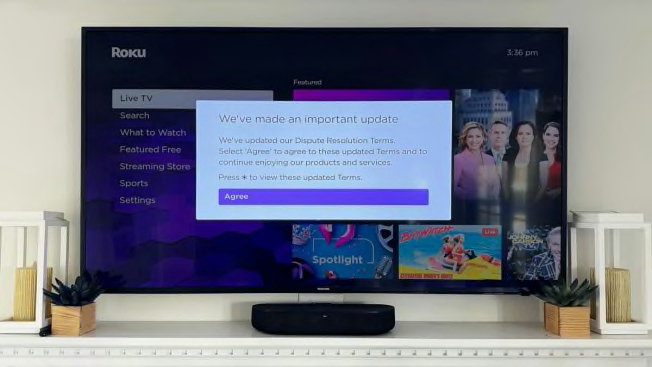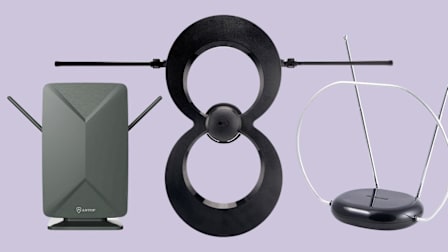Why Is Roku Disabling TVs?
Here's a closer look at the company's new "dispute resolution terms" and what you can do to opt out

In recent weeks, about 80 million Roku users in the U.S. who tried to watch TV were met with an ultimatum: Consent to the company’s new “dispute resolution terms” or find something else to do—read a book, perhaps.
Roku customers are furious because the company had essentially disabled their sets.
Indeed, when we turned on a Roku TV in our labs, we couldn’t access the menu to select a program without first clicking “agree” on the pop-up notice announcing the update.

Source: Consumer Reports Source: Consumer Reports
Can I Get My Roku to Work Without Clicking on ‘Agree?’
In short, no. But you can write a letter to then undo the agreement if you act quickly.
See below.
So What Did I Just Agree To?
Here’s a hint: The word “arbitration” appears 75 times in the dispute resolution terms, often preceded by “binding.”
A binding arbitration clause requires consumers to agree in advance to resolve any potential legal disputes not in an open courtroom under long-enshrined rules designed to ensure fairness but instead in a private forum where corporate adversaries have many advantages.
These days, most arbitration agreements also expressly forbid consumers from banding together in class-action lawsuits. That’s important, because few people would find a lawyer to sue a company on their own; the dollar amounts involved would just be too small. According to some advocates, blocking those lawsuits is the real aim of arbitration clauses.
But Hasn’t Arbitration Been Around for a Long Time? What’s Different Now?
Yes, mandatory arbitration agreements have grown ubiquitous across the consumer landscape in recent decades. In fact, Roku users had already been required to agree to one to use the company’s products.
But Roku’s latest version adds new language. It appears to be aimed at preventing a relatively new legal tactic, known as mass arbitration, that some consumer-side lawyers have used to fight arbitration clauses and bring disputes back into the sunlight.
In mass arbitration, plaintiffs’ lawyers simultaneously file hundreds or thousands of arbitration claims on behalf of consumers. It’s not the same as a class-action suit because each claim has to be handled individually. But the result is that the defendant company can quickly be hit with millions in up-front fees.
This tactic has effectively been used to push corporate defendants into favorable settlements, and some companies—including Amazon—have eliminated their arbitration clauses altogether as a result.
New arbitration agreements like Roku’s attempt to shift the balance of power back to corporations by making mass arbitration less expensive for companies and more burdensome for consumers. In this case, the updated language breaks up the arbitration process into many stages, stretching it out interminably and taking the teeth out of the mass arbitration effort.
“The rules are cynically tailored to give Roku all the benefits of arbitration that corporations like—no class actions, no jury, and no appeals—but would deny consumers the efficiency and speed they were previously promised in individual arbitration,” says Warren Postman, whose law firm is among the pioneers of mass arbitration but isn’t involved in a dispute with Roku. “Roku’s lawyers have clearly spent a lot of time thinking about how to make the process slow, complex, and burdensome for consumers in the hopes that they will give up on pursuing their rights.”
These policies are currently being challenged in courts around the country. In the meantime, Postman says, they appear designed to have a chilling effect on the ability of consumers to find lawyers to take their cases.
Did You Say That I Can Opt Out?
Yes, there’s a way to opt out—a burdensome one.
First, you have to agree to the updated terms if you want your TV or player to continue working.
Then you have 30 days to mail—yes, an actual written letter, in a stamped envelope—a notice of your decision to opt out to the following address:
General Counsel, Roku Inc.
1701 Junction Court, Suite 100
San Jose, CA 95112
The letter must include your contact info; the specific product models, software, or services you’re writing about; the email address you used to create your Roku account; and a copy of your receipt “if applicable.”
The agreement says that the letter has to be received “within 30 days of you first becoming subject” to these terms. The opt-out clock starts ticking once you receive an email notification from the company, which started going out in late February. It’s not clear if those who opt out will receive a notice that their request has been processed.
We asked Roku if the dispute resolution language changes were made to discourage mass arbitration filings and why it requires consumers to mail a letter instead of simply opting out digitally. The company declined to answer.
@consumerreports Consent to Roku’s new dispute resolution terms—or else. We sifted through the fine print and have answers to key questions. Learn more through the link in our bio. #roku #techtok #techtoktips #arbitration
♬ original sound - Consumer Reports

















